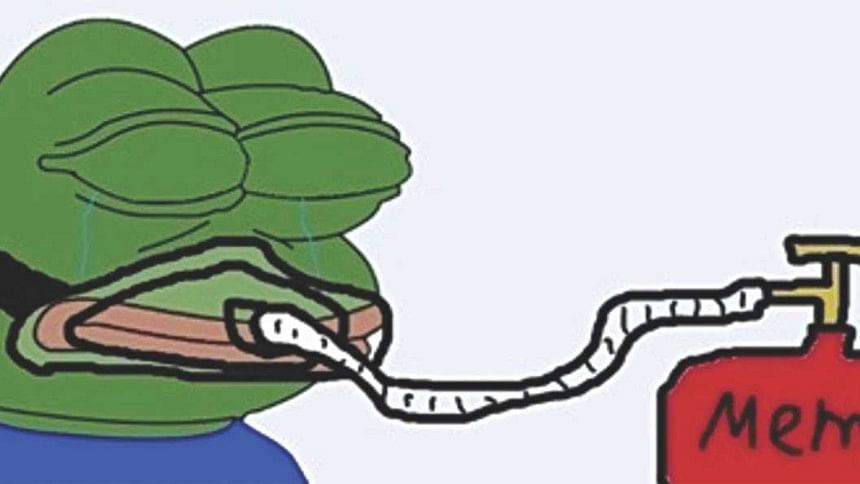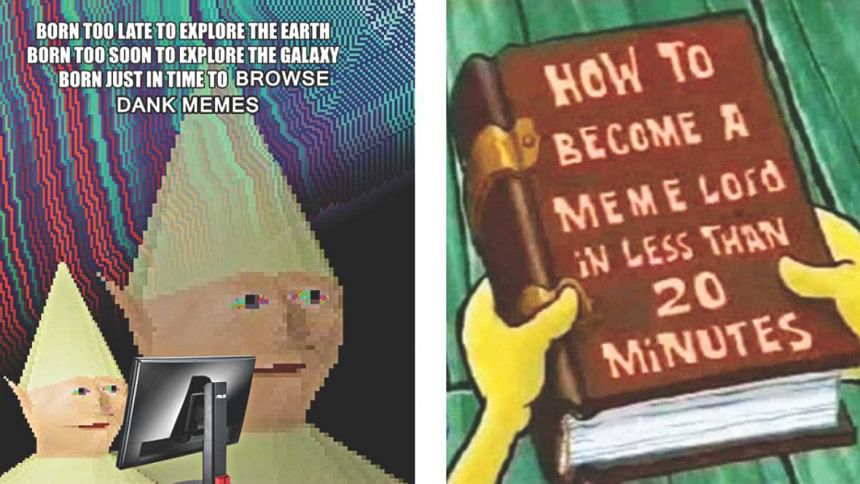A Study in Meme

"Memes started off as nothing more than relatable jokes, in the form of pictures and videos. However, it wasn't long before anything that went viral on the internet started to be considered a meme, be it a photo, an animal, or even a person."
Shafee stared at the three lines he'd managed to put together. His eyes drifted towards the time blinking on the corner of his computer screen. 12:45 AM it read. He wanted nothing more than to curl up under his thermal blanket and get some Sleep Serum into his system, but his essay was due the next day. You would've thought that, the year being 2056, someone would've done something about the incredibly stressful education system, but no. As a history major, the workload was worse for Shafee, since his predecessors had stirred up quite a lot of trouble over recent years. He shifted his attention back to his class notes and attempted to pick out useful lines.
"As the concept of memes gained popularity, different types, or genres, if you will, arose. Some memes were meant to appeal to the masses, while others were directed towards smaller groups. It didn't take long before there were memes for everyone to identify with. Memes for students, teachers, parents, children, optimists, nihilists—no part of society was excluded. Due to their far-reaching effects, memes began to be used as a marketing tool by various companies. Dreamers arose from different corners of the world, wishing to earn a living based on their passion for the meme. Quite a lot of them made it, too, because by that point, memes were no longer just a source of entertainment."
Shafee spent some more time painstakingly looking up facts related to the use of memes in the communications sector and slipping them into his essay. He then realised that he had reached the only enjoyable part of his assignment: the downward spiral of humanity due to memes.

"To the masses, 'tagging people in memes' had turned into an act which was supposed to strengthen social bonds. In reality, though, it led to silly disputes with major consequences. Best friends parted ways when one tagged someone else instead of their bestie. Marriages dissolved as spouses grew apart and stopped sending each other memes appropriate for their moods," Shafee thought it'd be nice to draw from his own parents' example for this, "The meme turned into an addiction worse than all other drugs that existed on the planet, keeping people rooted in front of their computer screens, laughing like maniacs, sharing, reblogging, and retweeting for hours on end."
There came a time when the average human's greatest aspiration was to become a meme. As people neglected their existing jobs while trying to go viral on the Internet, productivity in other sectors reached new lows. Many historians blame this meme craze for the surprisingly small amount of development in Earth's technology and research fields. People were simply too busy trying to be stupid and relatable on the Interwebs to bring about innovative changes.
As everyone strived to achieve the same goal, disagreements sprung up at alarming rates, and these ultimately culminated in the fearful Internet War. Though this war did not cause as many fatalities as the two World Wars before it, the mental stability of most young adults at that time was compromised severely. Finally, governments stepped in, to prevent all of humanity from reaching a vegetative state. They tried to make memes illegal, but that caused riots to break out in all parts of the world."
Shafee chuckled as he added more facts about the riots and how the governments handled them. The idea of people protesting for the right to look at a bunch of pictures was quite incomprehensible to him.
"Finally, world leaders stepped away from such drastic measures, and instead put together mandatory work hours, banned social media in the workplace, etc." Shafee felt a surge of gratefulness for the term "etc." which saved him from looking up additional facts.
"However, the biggest factor which contributed to this generation's distaste in memes was perhaps their disgust at the actions of humans before them, and their firm wish to never be like their parents. This, in turn, is motivating them to work harder, so that the world may once again experience massive reforms in science, trade, and in art."
Shafee was delighted to see that he had finally reached the two page requirement for his essay. He could finally get some well-deserved sleep. His jubilation was short-lived, though. As he made to get up from his chair, he realised the font size had been set to 20 instead of 12.
Despite being a hopeless fangirl, Marisha Aziz lives under delusions of awesomeness. Contact her at [email protected] to give her another excuse to ignore her teetering pile of life problems.

 For all latest news, follow The Daily Star's Google News channel.
For all latest news, follow The Daily Star's Google News channel. 



Comments